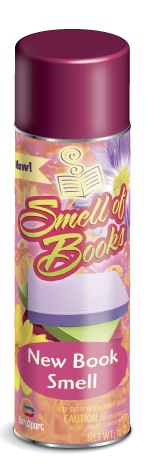"Do you know that books smell like nutmeg or some spice from a foreign land? I loved to smell them when I was a boy. Lord, there were a lot of lovely books once, before we let them go."--from Ray Bradbury's Fahrenheit 451
It is almost impossible to find an article about the e-books versus print books debate that does not include at least one person citing the importance of the "smell of books" as a primary reason for resisting the digital world's siren song.  If you're an addicted e-book reader who still misses l'odeur des livres, you might choose to compensate for that olfactory void with a can of Smell of Books, "a revolutionary new aerosol e-book enhancer.... Now you can finally enjoy reading e-books without giving up the smell you love so much."
If you're an addicted e-book reader who still misses l'odeur des livres, you might choose to compensate for that olfactory void with a can of Smell of Books, "a revolutionary new aerosol e-book enhancer.... Now you can finally enjoy reading e-books without giving up the smell you love so much."
But that is probably not an answer to the real question: Why do we care so much about that smell?
I've been a book person most of my life, yet only recently have I paid much attention to this particular issue. Sure, I loved the smell of those ancient, often untouched volumes that lined the dark wood shelves of our tiny village library when I was a kid. I even love the musty scent of the wares in used and antiquarian bookshops, which dredge up literary dust with every turned page, triggering my allergies. And when I open a newly acquired hardcover, there is something exquisite about that first waft of ink and paper that I cannot replicate with an iPad app... yet.
Addiction, indeed.
Sometimes the reason we smell books is practical. At a used bookstore run by the Friends of the Library, Montgomery County, Md., business manager James Ludlum uses his nose to determine what they will sell: "We get things that are in such poor condition and that you don't want them inside the place because they smell. We can tell the difference between a garage smell and attic smell and a basement smell." Sometimes the reason is artistic. Artist Rachael Morrison has been smelling books at New York's Museum of Modern Art library and keeping a ledger in which she describes the unique scent of each volume. She daydreams of someone in the future finding her notebook: "Assuming all text has gone digital at that point, I wonder if he or she will think it’s strange or even gross that books once had a smell. What will my notebook smell like?"
Sometimes the reason is artistic. Artist Rachael Morrison has been smelling books at New York's Museum of Modern Art library and keeping a ledger in which she describes the unique scent of each volume. She daydreams of someone in the future finding her notebook: "Assuming all text has gone digital at that point, I wonder if he or she will think it’s strange or even gross that books once had a smell. What will my notebook smell like?"
Morrison is attempting to capture the ephemeral with her project: "Smelling books is really nostalgic for me--I am often reminded of my grandparents’ homes, or libraries where I used to go when I was a child."
I suspect we're all a little Proustian in that way; it's a madeleine moment for most of us, as old as books and readers.
In 1853, a fan of Harper's magazine wrote to tell the editor how the scent of a new issue served as his own memory catalyst:
Old Noah Webster's Spelling-book was my first acquisition; with its coarse, blue paper, and white-yellow sheep-skin back, and the strong, or "new-book odor," which pervaded its leaves, when pressed open. This, together with the Third Part and the American Preceptor, was our first literary treasure; and a faint, wandering smell, or rudiment of smell, that floated up to my nostrils as I opened your Magazine, brought back to me the manner in which we procured them; how we cut with sickles the grass, when it was ripe, that grew in the corners of the crooked, zig-zag fences; and having bound it up in bundles, put it in the barn; and when we had gained the necessary leisure, threshed it out, winnowed the seed in an old fanning-mill, and then sold it for "grass-seed;" and how, also, we parted the fresh bark from hemlock-logs in the swamp, piled it up to dry, and then sold it to a neighboring tanner; both of which operations enabled us to "lay in" our school-books, as afore-said, and, likewise, to purchase a copy of Pilgrim's Progress, and--strange juxtaposition--Roderick Random. All this came into my head, and it is now out of it.
That's a classic "smell of books" story. A century and a half later, you can imagine the smell of the new print, the freshly cut grass... and the old, old books.--Robert Gray (column archives available at Fresh Eyes Now)

